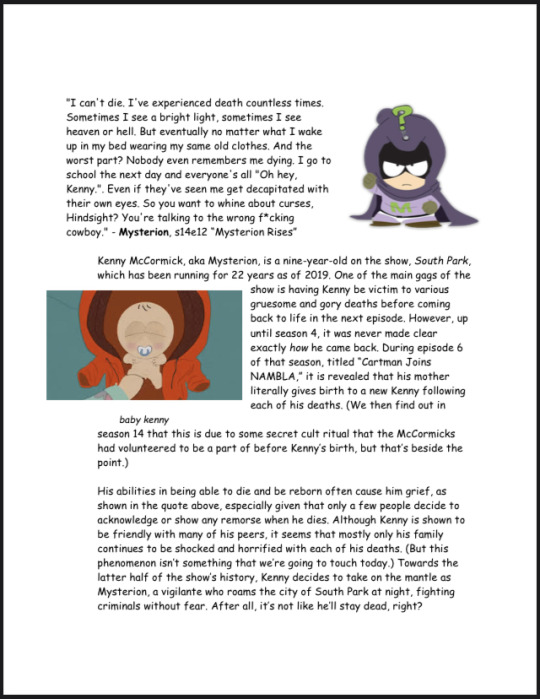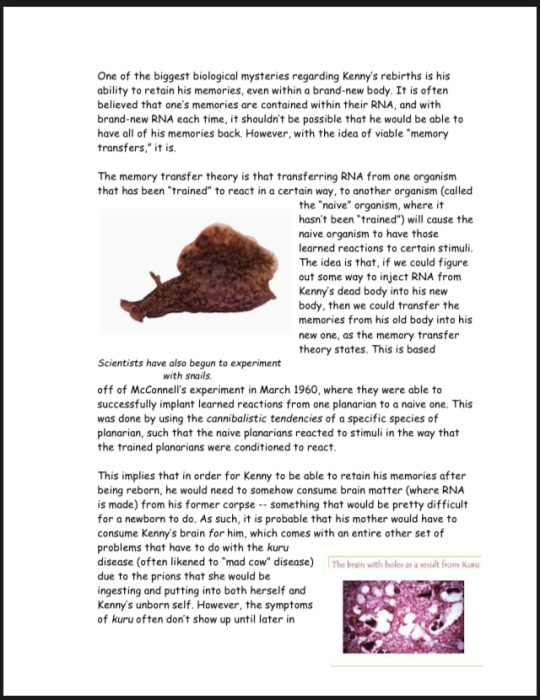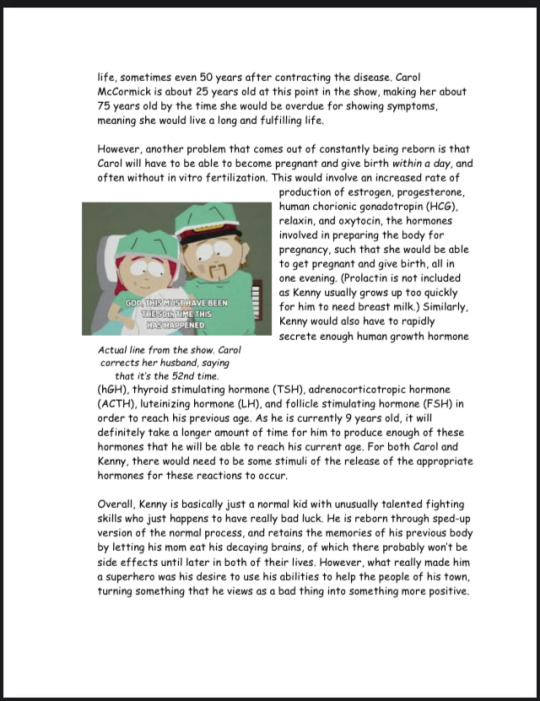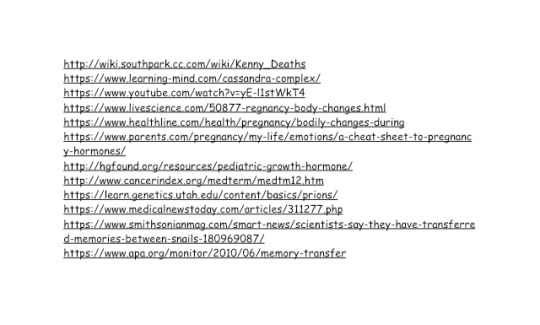#ALSO WHY DID I DO MY CITATIONS LIKE THIS???? NOT EVEN APA??? MLA????? NOTHING????
Explore tagged Tumblr posts
Text
presenting the topic of my ap bio final paper: the curious case of one kenny mccormick



readable text and poorly done citations under the cut
"I can't die. I've experienced death countless times. Sometimes I see a bright light, sometimes I see heaven or hell. But eventually no matter what I wake up in my bed wearing my same old clothes. And the worst part? Nobody even remembers me dying. I go to school the next day and everyone's all "Oh hey, Kenny.". Even if they've seen me get decapitated with their own eyes. So you want to whine about curses, Hindsight? You're talking to the wrong f*cking cowboy." - Mysterion, s14e12 “Mysterion Rises”

Kenny McCormick, aka Mysterion, is a nine-year-old on the show, South Park, which has been running for 22 years as of 2019. One of the main gags of the show is having Kenny be victim to various gruesome and gory deaths before coming back to life in the next episode. However, up until season 4, it was never made clear exactly how he came back. During episode 6 of that season, titled “Cartman Joins NAMBLA,” it is revealed that his mother literally gives birth to a new Kenny following each of his deaths. (We then find out in season 14 that this is due to some secret cult ritual that the McCormicks had volunteered to be a part of before Kenny’s birth, but that’s beside the point.)

His abilities in being able to die and be reborn often cause him grief, as shown in the quote above, especially given that only a few people decide to acknowledge or show any remorse when he dies. Although Kenny is shown to be friendly with many of his peers, it seems that mostly only his family continues to be shocked and horrified with each of his deaths. (But this phenomenon isn’t something that we’re going to touch today.) Towards the latter half of the show’s history, Kenny decides to take on the mantle as Mysterion, a vigilante who roams the city of South Park at night, fighting criminals without fear. After all, it’s not like he’ll stay dead, right?
One of the biggest biological mysteries regarding Kenny’s rebirths is his ability to retain his memories, even within a brand-new body. It is often believed that one’s memories are contained within their RNA, and with brand-new RNA each time, it shouldn’t be possible that he would be able to have all of his memories back. However, with the idea of viable “memory transfers,” it is.
The memory transfer theory is that transferring RNA from one organism that has been “trained” to react in a certain way, to another organism (called the “naive” organism, where it hasn’t been “trained”) will cause the naive organism to have those learned reactions to certain stimuli. The idea is that, if we could figure out some way to inject RNA from Kenny’s dead body into his new body, then we could transfer the memories from his old body into his new one, as the memory transfer theory states. This is based off of McConnell’s experiment in March 1960, where they were able to successfully implant learned reactions from one planarian to a naive one. This was done by using the cannibalistic tendencies of a specific species of planarian, such that the naive planarians reacted to stimuli in the way that the trained planarians were conditioned to react.

Scientists have also begun to experiment with snails.
This implies that in order for Kenny to be able to retain his memories after being reborn, he would need to somehow consume brain matter (where RNA is made) from his former corpse -- something that would be pretty difficult for a newborn to do. As such, it is probable that his mother would have to consume Kenny’s brain for him, which comes with an entire other set of problems that have to do with the kuru disease (often likened to “mad cow” disease) due to the prions that she would be ingesting and putting into both herself and Kenny’s unborn self. However, the symptoms of kuru often don’t show up until later in life, sometimes even 50 years after contracting the disease. Carol McCormick is about 25 years old at this point in the show, making her about 75 years old by the time she would be overdue for showing symptoms, meaning she would live a long and fulfilling life.

However, another problem that comes out of constantly being reborn is that Carol will have to be able to become pregnant and give birth within a day, and often without in vitro fertilization. This would involve an increased rate of production of estrogen, progesterone, human chorionic gonadotropin (HCG), relaxin, and oxytocin, the hormones involved in preparing the body for pregnancy, such that she would be able to get pregnant and give birth, all in one evening. (Prolactin is not included as Kenny usually grows up too quickly for him to need breast milk.) Similarly, Kenny would also have to rapidly secrete enough human growth hormone (hGH), thyroid stimulating hormone (TSH), adrenocorticotropic hormone (ACTH), luteinizing hormone (LH), and follicle stimulating hormone (FSH) in order to reach his previous age. As he is currently 9 years old, it will definitely take a longer amount of time for him to produce enough of these hormones that he will be able to reach his current age. For both Carol and Kenny, there would need to be some stimuli of the release of the appropriate hormones for these reactions to occur.

Actual line from the show. Carol corrects her husband, saying that it’s the 52nd time.
Overall, Kenny is basically just a normal kid with unusually talented fighting skills who just happens to have really bad luck. He is reborn through sped-up version of the normal process, and retains the memories of his previous body by letting his mom eat his decaying brains, of which there probably won’t be side effects until later in both of their lives. However, what really made him a superhero was his desire to use his abilities to help the people of his town, turning something that he views as a bad thing into something more positive.
citations:

(tumblr wouldn’t let me actually paste the links 😐)
#kenny mccormick#carol mccormick#stuart mccormick#mysterion#south park#south park theory#apparently there was also a diagram of a brain and body that i drew and pasted onto my project but idk where it is#if i find it i’ll add an addendum#we’d had a couple different choices for our final project and i narrowed what i wanted to do down to#a paper finding a biological explanation for a superhero’s powers (mysterion) and a research paper on whatever research technology#(i would’ve liked to do my paper on deep brain stimulation but nooooo ms t thought it would be boring 😒)#i pulled so much shit out of my ass for this paper it almost makes me embarrassed#ALSO WHY DID I DO MY CITATIONS LIKE THIS???? NOT EVEN APA??? MLA????? NOTHING????#this is a fucked up theory tho right???#just realized that i said that carol is 25 in the show 🙄
121 notes
·
View notes
Text
How to Write a 20-Page Research Paper in Under a Day
This is another post that I brought over from one of my other sites that I’m re-purposing. I’d like to say that this post was primarily just meant to be funny and is NOT how you should actually write any sort of composition that requires ACTUAL research. But in theory, you could write a “research” paper this way. I know this because I did this for a paper for a city-planning course I took in college, but I’m not proud of it...okay, maybe a little proud. Seriously, under a day.
So you've procrastinated again. Two months ago, when your professor assigned this to you, you told yourself you wouldn't wait till the end like this. But you procrastinated anyway. Shame on you. It's due in a few hours. What are you going to do?
In a sentence: write a long fiery rant and then cherry-pick sources. Yeah, it’s dirty. And you’re selling 3 grams of your soul. But hey, you chose Netflix binges over your paper these past few months, so this is where we are, one day before the deadline.
Pick a Topic
The more controversial your topic is, the better. This generally results in a long history of court cases which works well for this format.
It has to be something you feel strongly about, as in it makes you want to open your window and yell and shake your fist about it at joggers passing by. That strong.
It also has to be something that you already know some stuff about.
It also needs to have some depth to it. It can't be like "We should have free pizza in lecture every Friday". That's lame. Unless you're really creative, then that could possibly work if your professor has a sense of humor and you really can write 20 pages about something silly like that. Generally that will only work in a creative writing class.
Make a list
...of every possible outcome that this issue could cause in
...the near future
...the far future
...of every person that this topic affects.
...of any instances where this topic has come in the news that you can remember.
...what you would personally do about this topic if you had the chance/power/enough-sugar/genies
...any little detail you can think of
The important thing about this is to think of ABSOLUTELY EVERYTHING, no matter how silly or far-fetched. It'll make your professor go "hmm, didn't think about that one". You can even get your friends to help you with this one. The more the merrier.
Reorder everything
Put your most obvious argument first.
Then put weird off-the-wall stuff, in any order, regardless of importance.
Put the strongest argument for your case next.
Now list the incidents that will help argue for your point. Don't know of any incidents in the news to help argue your point? That's ok. Make up some, except keep it really really generic. When it comes time to quote the source, remember this: There are over 7 billion people in the world. There are countless newspapers and other sources that document people doing...stuff. If you list incidents that are generic enough and your topic isn't extremely weird, at least one person out there has done something notable/stupid/crazy enough to make it to the news. Also, people have sued each other over everything imaginable. Find a court case database. Your topic has SOMEHOW manifested itself in court at some point in history. I can almost guarantee it. Just make sure that the situations you come up with are physically possible.
Now, list everything that could be construed to be the answer to the question "if elected, what would you do about this issue?"
It's best to keep all this in the form of an outline.
Spaces
Now add several lines of space under each bullet. Keep adding spaces until your text document has reached the goal size of your paper (e.g. 20 pages).
Now print it out. On paper.
Get the hell away from your computer
I'm serious.
Go outside and sit under a tree. If you hate outside, or if it's too cold for humans to survive, or if there's a pack of rabid dogs roaming your neighborhood, good. It'll help you write faster.
The reason why you should do this is because everyone magically becomes A.D.D. when they are near a computer. You can check Facebook later.
Write
Write a fiery rant in each of the spaces you allotted. Get pumped. Just don't begin every paragraph with "I swear upon my father's grave..." Also try not to repeat yourself too much. Be very specific. Talk to your reader as though they've never heard of your subject before. Write at about the same size that your typed version will be. Don't worry too much if you don't fill in all the spaces. But if you feel strongly enough about your topic, then this really shouldn't be a problem. If you're like me and can't think linearly you can skip around as much as you want.
Go Back Inside
Type everything. You'll also notice more things occur to you as you type. Go ahead and throw them in in the corresponding categories. Don't jump around too much at this point though. Maintain focus and bash out that essay as fast as possible. Because at this point, that’s all this is: an essay, not a research paper. Although you should do this as fast as possible, be militant about correcting typos. Those little things really make it evident you did this at the last minute if left unchecked.
Time for that whole "research" part
Believe it or not, nothing you said in your rant was original. Remember what I said earlier about 7 billion people? That applies now. Pick each topic/case/scenario/sub-point. Anything you had to say about those has already been said by some scholar or professor or newspaper. Google it up. It won't take long. Take a few key words from your main argument of each section and see what you get. Paraphrase their main argument or quote a few lines. Add the proper citations. Do NOT plagiarize.
Formatting
Some word processors are capable of non-integer spacing. Try 2.1 or 2.2 spacing.
There's also the margin trick.
If your text editor allows, adjust the kerning so even the letters are spaced further apart.
Did your professor specify to use MLA citations? She/he didn't? Good. APA citation guidelines are much more friendly with website sources. Check it out.
Print.
Turn in.
Good job. Have a cookie.
Never again. Do it right next time.
14 notes
·
View notes